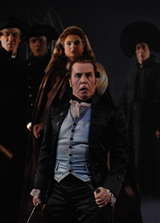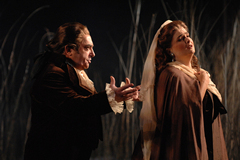| Opera Australia Un Ballo in Maschera (A Masked Ball) Giuseppe Verdi Performed in Italian with English surtitles Venue: Opera Theatre | Sydney Opera House Evenings: February 20, 23, 26, 29; March 10, 13, 19, 29 @ 7.30pm Matinee: March 8 at 1.00pm Review written by Eliza Eggler |
| Sunday, 24 February 2008 |
 Giuseppe Verdi’s Un Ballo in Maschera (A Masked Ball) is considered by some to be a masterpiece whilst others have described it as his ‘worst opera’; and whilst Opera Australia’s current production is not the ‘worst opera’ I have seen, it is disappointing. Wednesday’s opening night performance is a good example of all the worst stereotypes that people think of when the word ‘opera’ is mentioned; these include overacting, ridiculous costumes, and portly singers bellowing in unattractive tones about an impossible and unrequited love. Giuseppe Verdi’s Un Ballo in Maschera (A Masked Ball) is considered by some to be a masterpiece whilst others have described it as his ‘worst opera’; and whilst Opera Australia’s current production is not the ‘worst opera’ I have seen, it is disappointing. Wednesday’s opening night performance is a good example of all the worst stereotypes that people think of when the word ‘opera’ is mentioned; these include overacting, ridiculous costumes, and portly singers bellowing in unattractive tones about an impossible and unrequited love.The opera tells the story of King Gustav III of Sweden who is murdered by his best friend Anckarstroem at a masked ball. Anckarstroem kills Gustav after learning that the king and his wife are in love with one another and have had a secret rendezvous. ‘Un Ballo in Maschera’ is full of wonderful music and has the potential to be a really exciting piece of theatre. This production however, which is now over twenty years old, is anything but exciting and looks quite worn out and drab. The first scene of the first act is set in the king’s audience chamber and we are introduced to most of the opera’s main characters. King Gustav (Dennis O’Neill) does much of his singing from a ridiculous looking winged throne and unfortunately looks anything but a king. His singing seems insecure and he has difficulties moving between the middle and upper registers of his voice. Oscar, the king’s page (Natalie Jones) sings competently and portrays a lively and cheeky character. She has however an excessive vibrato which detracts from what is otherwise a very good voice. Scene two of the first act is set in Ulrica the fortune tellers hut and the stage is so dimly lit that it’s difficult to see who is singing what. Ulrica, (Bernadette Cullen) wearing a costume of rags and with feathers in her hair, looks somewhat like a cross between Hiawatha and Oliver Twist. She sings an aria to invoke spirits and as with the other female singers in this cast has excessive vibrato. After she tells some fortunes, Ulrica sends everyone away and the heroine Amelia (Nicole Youl) arrives seeking a cure for her forbidden love. Ulrica suggests a herb which can only be found growing beneath the cities gallows and Amelia resolves to get some that very night. Act two scene two is where Gustav and Amelia, alone together at last, confess their love for one another in one of opera’s most beautiful duets. The singing is not bad and the tenor seems to have settled in to his voice more by this stage. Miss Youl has a powerful and at times beautiful voice, although once again I found the vibrato to be excessive and this detracts from her lovely tone. My main objection to this scene is that it is simply impossible to believe that these two characters are in love. The soprano is considerably taller than the portly tenor and looks beautiful, but Gustav, the object of her affection looks comical in his costume and wig (I couldn’t help imagining Danny de Vito cast opposite Catherine Zeta Jones). After singing a luscious and passionate duet together they grab one another as if hanging on to a block of wood and as the audience applauds, look most uncomfortable indeed. Act three scene one, Anckerstroem (Michael Lewis) has discovered his wife’s betrayal and decides that she deserves to die. He sings the aria ‘Eri tu, che macchiavi quell’ anima’ with a beautiful, steady baritone voice and this was the only instance in the whole evening that I felt slightly moved. The second scene of this act is devoted to the masked ball where the murder of Gustav is to take place. The stage finally comes alive and it is a relief to see some movement. Up until now, the action has been thoroughly static and with the dim lighting effect, keeping the eyes open has been difficult. The chorus sings well and it’s a joy to hear the massed voices, although why the choristers are all dressed in identical costumes of what looks like grey silk is anyone’s guess. Anckerstroem finally does the deed, stabbing Gustav and fatally wounding him. Gustav takes some time to die however and manages to sing a last aria before finally passing away. Just prior to his death he makes a choking sound and rather than tears on my behalf I almost laughed, so unrealistic was the acting. This production of ‘Ballo’ is disappointing indeed. The stage is often static and boring to watch, the singing is mediocre and the acting not believable. On top of this it’s impossible to imagine that Gustav and Amelia are remotely attracted to each other, let alone madly in love! The audience reaction fluctuated between cool and luke warm and I couldn’t help noticing that the seats in front of me had been vacated after the second interval. It is definitely time for a new production of this Verdi ‘masterpiece’ and if Opera Australia wants to continue attracting an audience it’s time to say goodbye to this tired looking production. Having said that, if you just love Verdi and want to hear some beautiful music, then by all means take a look. If however you want to see an exciting and challenging piece of theatre, then don’t worry about this one. |
Sunday, February 24, 2008
Un Ballo in Maschera, SOH, Feb 24, 2008
Friday, February 22, 2008
Wednesday, February 20, 2008
Un Ballo in Maschera, SOH, Feb 20, 2008
| Opera Australia's Ballo falls short by Sarah Noble | |
| Verdi: Un ballo in maschera Opera Australia Sydney Opera House 20 February 2008 | |
| In lesser hands, such a work might become mere self-caricature. Verdi's treatment, however, ensures that while UN ballo in maschera embodies those conventions, it also enlivens them. It follows a formula, but does so with concentrated energy and incredible skill, and therein lies its appeal. Ballo is excellent but not extraordinary, and thus requires something extraordinary in its execution to truly succeed. A superlative cast, or a fascinating production; or even better, both. Opera Australia's UN ballo in maschera unfortunately provides neither. Maestro Licata's passion can't be doubted, but the performance he leads lacks shape and rhythmic drive. The orchestral palette seems uncharacteristically limited - even the seriously spooky music which introduces the satanic fortune teller Ulrica lacks impact, hard to believe given Verdi's hugely atmospheric writing for the scene. The first act in particular was marred by a lack of cohesion between orchestra and soloists. John Cox's production, directed for revival by Luise Napier, is similarly uninspiring, offering little insight or character development. The opening scenes hint at a deeper interpretation - Gustav's throne room is overshadowed by glimpses of Ulrica's lair which loom behind, a hint of his increasingly threatened position. However, later scenes fail to follow this notion through effectively, and the singers are left relatively directionless. Michael Stennett's impressive costume designs are perhaps the most vivid aspect of the production - otherwise the result is disappointing. | |
|
Nicole Youl sings Amelia with some beauty but little electricity. Even in her highly dramatic graveyard scene, surrounded by swirling mist and the corpses of executed criminals, she seems strangely detached. Her performance intensifies for the final act, however, and "Morro, ma prima in grazia" is quite moving. Mezzo soprano Bernadette Cullen, by contrast, makes much of the role of Ulrica, glorying in the fortune teller's doom-laden and eerie music. Her dark, austere sound is suitably scary, and she makes liberal and gratifying use of her chest register. Natalie Jones brings sweetness of tone and a sense of fun to the exuberant page Oscar, but her coloratura is laboured and lacks sparkle. Among the supporting cast, Andrew Moran is a standout as a bright-toned sailor, and Jud Arthur brings his usual suave, expressive baritone and appealing stage presence to the role of the conspirator Count Ribbing. The chorus sings well as always, but seems less at ease in this idiom than elsewhere. UN ballo in maschera isn't the most celebrated of Verdi's operas, and neither should it be. However, it is top shelf Verdi just the same, and marks an important point on the path to the greatest of his masterpieces. It is a work of conventional excellence laced with hints of utter genius, and needs a performance to match. Despite intermittently valiant attempts, Opera Australia's production ultimately falls short. | |
| Text © Sarah Noble Photos © Branco Gaica |






 UN ballo in maschera is the ultimate grand opera, embodying both the genuine conventions of the genre and the popular, slightly ridiculous stereotype. Within its brisk plot, it incorporates all the elements some might imagine are to be found in every opera - royalty, political intrigue, lovers' trysts, disguises, vengeance, murder. The subject is romanticised history. Gustav III of Sweden loves Amelia, and is loved in return. But Amelia is married to Anckerstroem, Gustav's best friend and Secretary of State. When Anckerstroem discovers the pair's mutual affection, he joins a conspiracy to kill Gustav, ultimately stabbing the king at the titular masked ball. Gustav survives just long enough to pardon his assassins and assure Anckerstroem of Amelia's purity.
UN ballo in maschera is the ultimate grand opera, embodying both the genuine conventions of the genre and the popular, slightly ridiculous stereotype. Within its brisk plot, it incorporates all the elements some might imagine are to be found in every opera - royalty, political intrigue, lovers' trysts, disguises, vengeance, murder. The subject is romanticised history. Gustav III of Sweden loves Amelia, and is loved in return. But Amelia is married to Anckerstroem, Gustav's best friend and Secretary of State. When Anckerstroem discovers the pair's mutual affection, he joins a conspiracy to kill Gustav, ultimately stabbing the king at the titular masked ball. Gustav survives just long enough to pardon his assassins and assure Anckerstroem of Amelia's purity.  Verdi specialist Dennis O'Neill sings Gustav. This style is evidently in O'Neill's blood and he responds passionately to the role's declamatory climaxes. As an authoritative leader, his singing is compelling. But Gustav is also supposed to be madly in love, and here O'Neill is far less convincing. Coupled with a repertoire of almost cartoonish stock gestures, his shouted expressions of tender feeling are difficult to credit - his facial and vocal expression in these moments bearing little resemblance to the words being sung. Michael Lewis' Anckerstroem is a more persuasive characterisation, his patrician baritone conveying subtler authority.
Verdi specialist Dennis O'Neill sings Gustav. This style is evidently in O'Neill's blood and he responds passionately to the role's declamatory climaxes. As an authoritative leader, his singing is compelling. But Gustav is also supposed to be madly in love, and here O'Neill is far less convincing. Coupled with a repertoire of almost cartoonish stock gestures, his shouted expressions of tender feeling are difficult to credit - his facial and vocal expression in these moments bearing little resemblance to the words being sung. Michael Lewis' Anckerstroem is a more persuasive characterisation, his patrician baritone conveying subtler authority.